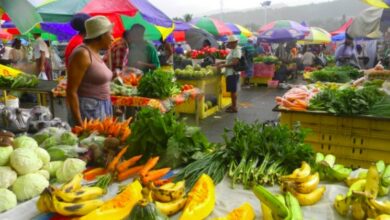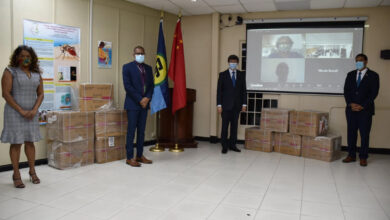(Caribbean Agricultural Research and Development Institute, 30 April, 2020, Trinidad and Tobago) – The COVID-19 pandemic has disrupted agriculture value chains, threatening food security and upending livelihoods of millions of people around the globe. Up to April 24, 2020 there were collectively more than 1,000 confirmed cases in the CARICOM region. To contain the virus and safeguard the livelihoods of the population, regional governments have instituted a series of policy measures. The fallout from these have impacted the region’s agriculture sector leading to surpluses of produce on farmers’ hands, limited intra-regional trade and unemployment.
While food supplies in the Caribbean are presently stable, Barton Clarke, CARDI’s Executive Director says “an extended period of this crisis coupled with the ongoing drought and the predicted active 2020 hurricane season will put the region’s agri food supply chains on a precarious footing”. “The Caribbean must set about producing its own food, promoting healthy food consumption and look towards import substitution as viable solutions towards ensuring food security in these uncertain times,” Clarke continued.
CARDI has developed a comprehensive plan that is structured to minimise any future disruptions to Agri-food supply chains. Short term measures are focused on providing the critical support needed to maintain the integrity of the food supply chains while medium to long term measures address long term food security from the perspectives of increased production,
reduced reliance on imports and resilience.
Immediately the Institute has ramped up the production of planting
material for a variety of crops including grain legumes, corn, coconut,
cassava, hot pepper and sweet potato across member states. These would
be made available to commercial producers and home gardeners. In Antigua
and Barbuda and St Kitts and Nevis, CARDI is also supporting national
drives to increase production to meet the shortfall of fresh produce.
The Caribbean agriculture sector has been dealt a severe blow by extreme weather events over the last few years. These crises coupled with the prevalence of drought conditions have thwarted the rebuilding efforts in many countries. With the hurricane season just one month away the agriculture sector must be positioned to restart production with immediacy should any of the 18 predicted hurricanes for 2020 hit the Caribbean. CARDI is leveraging its partnerships with Tissue Culture Labs in Jamaica and St Vincent and the Grenadines in particular to collect and conserve both seed and vegetative planting material for crops of priority importance to the Region. From these collections quality planting material will be supplied to farmers to restart production. This intervention will result in minimal disruptions to food supply chains.
As part of the Institute’s resilience strategy, CARDI will continue to evaluate, train and sensitise stakeholders on modern agricultural practices. Research is showing that the use of hydroponics, vertical farming, shade houses and container systems can be more productive and offer greater resilience over traditional systems.
CARDI will also continue to evaluate and identify resilient high yielding varieties for commercially important crops.
Towards promoting the use and consumption of local foods, CARDI will
work with partners to train agro processors on value added product
development, good manufacturing processes and health and safety. This
will not only extend the shelf life of produce beyond their marketing
season but will also increase the profit margins to processors and farmers.
These interventions will be complemented by the deployment of ICT enabled data collection and analytical tools.
A robust knowledge management system and resource mobilisation drive will also be pursued to help in realising the objectives of increased production, development of a resilient sector, change in behaviours, reduced food imports to the Caribbean and better decision making.
For more information, please contact
Office of the Executive Director (CARDI) – executive@cardi.org






